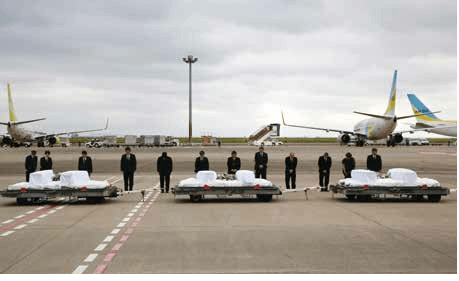Issue:
The brutal terrorist killings of the Japanese victims were conducted by spoiled youths whose larger goals remain unclear.
Lessons of the Dhaka tragedy
by MONZURUL HUQ

The bodies of the Japanese victims are met at Haneda Airport by Japanese officials on July 5.
FEW COULD HAVE IMAGINED that a terrorist attack could happen in a country with such close bonds to Japan, one that has not been susceptible to any form of extreme fundamentalism. So what occurred on that fateful evening on the first day of July in the capital of Bangladesh shocked the Japanese and the global community.
Dhaka, with a population of almost 12 million, is a divided city in the sense that it is, in reality, a combination of localities formed by the strict sense of social divisions in accordance with the status and material well being of its citizens. Those at the upper end have their heavenly enclaves, guarded heavily after a fatal attack on an Italian two years ago. The area is also known as the diplomatic enclave of the city, as it hosts all the foreign embassies and diplomatic residences. Among the homes of the wealthy locals and foreign nationals, including those with diplomatic immunity, are posh restaurants and dining places that are virtually out of bounds for most locals from the other end of the great divide. A meal or snack might cost them their entire monthly earnings.
So, it is mostly expatriates along with a handful of wealthy Bangladeshis who venture out to those places. And with July being a hot and humid month in Bangladesh, if foreign visitors do decide to forsake the cool hotel interior for a meal, they’ll go to these places that are recommended for them to visit.
The group of foreigners enjoying their weekend gathering on July 1 had no hint of their fate. But the jolly good atmosphere at the lakeside restaurant was shattered by gunmen fanatics; the end result was twenty casualties, including seven Japanese and nine Italians. Many of them were brutally killed in a savage manner that has become a sign of Islamic State fanatics in the Middle East.
The nationalities of the majority of the foreign victims raised the question of whether the two nations were specifically targeted for the killing. In fact, in two separate earlier incidents, the foreign nationals who were gunned downed also happened to be from Japan and Italy. However, the circumstantial evidence of the mass killing in Dhaka suggests otherwise. It was not that Japanese and Italians were specifically targeted they just turned out to be incidental victims.
SADLY, VIOLENT EVENTS IN which Japanese citizens have become incidental targets of attacks by Islamic fanatics are not at all new. Recent years have seen Japanese gunned down in Tunisia, Algeria, Egypt and elsewhere. These were all unfortunate happenings as they were simply caught in random shootings. However, the dimensions of the Dhaka tragedy have a different perspective in that the Japanese were brutally murdered in a most cold blooded manner, along with the Italians. With little knowledge of the tensions in the region, many in Japan are finding it hard to understand why their citizens have been victimized so savagely.
The point is that the perpetrators likely wanted to practice their savagery on any available foreign national. They probably thought would make a huge publicity splash and spread panic among foreign nationals in Bangladesh to the extent that many would decide to leave the country. The attack came at a time when the relatively better economic performance of the country has been attracting more foreign investment and business visitors.
The Islamic fanatics’ goal seems to have been to hit the economy with the larger aim of destabilizing the moderately secular government and the unaware foreign nationals provided a soft target. But was that their ultimate goal? Or was it to declare their solidarity with the mad mullahs of the Islamic State? Or was it to demand that Bangladesh should be declared an Islamic country with the full implementation of Sharia law?
But what is clear now is that they have failed miserably to reach anywhere near any of those targets. The attack also exposed the shaky ground on which they stood. Holding guns and explosives does not guarantee winning over the hearts of the people if the cause is vague and unclear.
The dead bodies of the perpetrators of the Dhaka terror attack have been rotting in the cold morgue since they were gunned down in the early morning of July 2. That they are still there illustrates a truth in a much more convincing way than the terrorist actions of those spoiled youths. No one has come forward to claim their bodies for formal burial, not even their parents, who have said they could not forgive the crime their sons had committed.
So the bodies continue rotting, perhaps offering the greatest lesson that we can take from the whole incident. Young people can become easily spoiled by misguided religious teachings that fail miserably to equate barbaric acts with heroism in the public’s mind. They need to understand that the two are on opposite extremes and have completely different consequences.
Monzurul Huq represents the Bangladeshi national daily, Prothom Alo. He was FCCJ president from 2009 to 2010.

